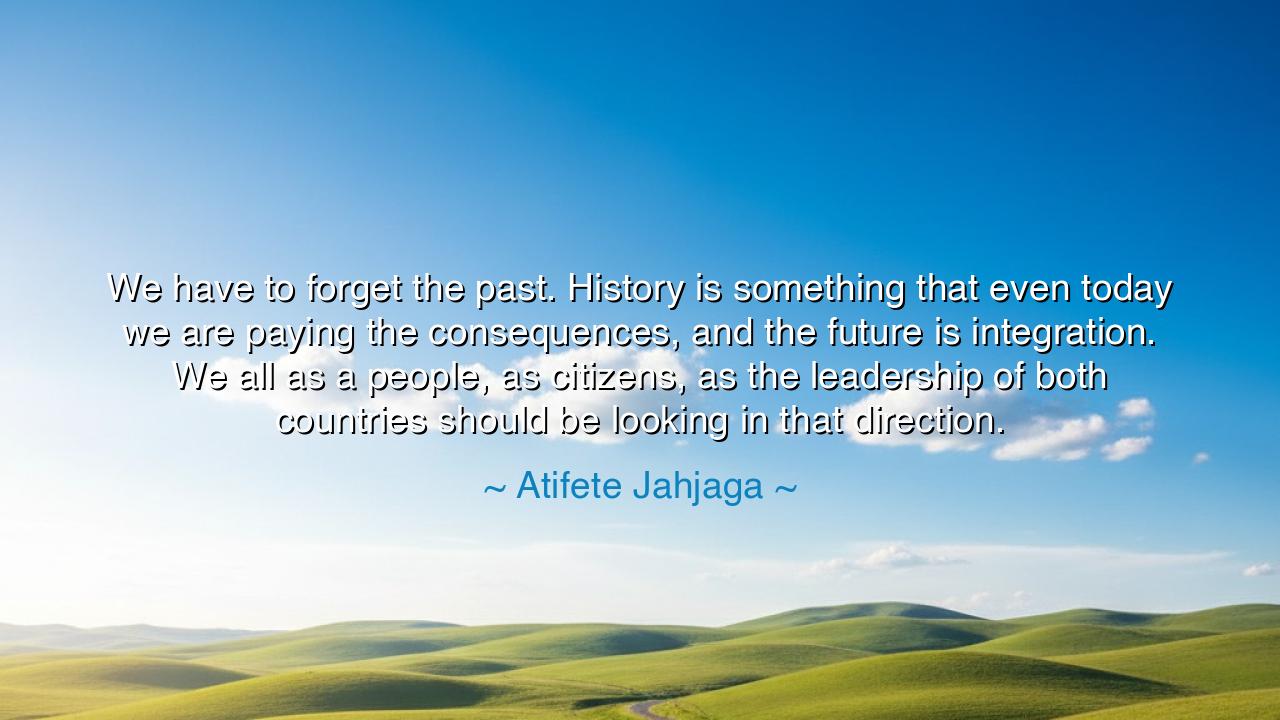
We have to forget the past. History is something that even today
We have to forget the past. History is something that even today we are paying the consequences, and the future is integration. We all as a people, as citizens, as the leadership of both countries should be looking in that direction.






The words of Atifete Jahjaga—“We have to forget the past. History is something that even today we are paying the consequences, and the future is integration. We all as a people, as citizens, as the leadership of both countries should be looking in that direction.”—are born from the heart of a leader who has seen the wounds of division and yearns for the healing of unity. Spoken by the first female president of Kosovo, a nation forged in the fires of conflict, her words are both a lament and a prophecy. They carry the ancient weight of human sorrow and the eternal hope of renewal. In them, she calls her people—and all people—to rise beyond the shackles of history, to stop bleeding from old wounds, and to walk together toward a shared and peaceful future.
To “forget the past,” as Jahjaga says, is not to erase it. It is to release its hold upon the present, to refuse to let ancient hatred and inherited pain dictate the destiny of tomorrow. In her voice we hear not denial, but liberation. For too long, nations have carried the ghosts of war in their hearts, feeding the fire of vengeance across generations. Jahjaga speaks as one who knows the cost of such remembrance—the cost written in graves, in broken homes, and in the weary eyes of children who inherit the burden of their ancestors. Her words are a call to wisdom: that memory without mercy becomes a prison, but memory tempered by forgiveness becomes a bridge.
She speaks, too, of integration, a word that in her time meant not only the joining of nations, but the reconciliation of souls. In the aftermath of war between Kosovo and Serbia, the divisions were deep, and the distrust ancient. But Jahjaga, standing as a symbol of progress, called for a future built not upon isolation, but upon unity. This idea is as old as civilization itself. Even in the ancient world, after empires clashed, wise rulers sought peace through alliance. The Romans, after conquering their foes, offered them citizenship; the Greeks, after centuries of strife among their city-states, found unity through culture and faith. The lesson of history, she reminds us, is not that division is destiny, but that integration is salvation.
Yet, the struggle to transcend the past is not confined to nations—it is the struggle of every human heart. How many among us carry grudges, regrets, or shame that chain us to what has already died? Jahjaga’s wisdom speaks to each soul: to truly live, one must forgive, both others and oneself. Just as nations must learn to move forward without hatred, individuals must learn to walk without the weight of old pain. For as long as we remain prisoners of yesterday, we cannot enter the temple of tomorrow. The past is a teacher, not a master; to dwell in it is to let life pass while we are still looking backward.
History itself gives testimony to her truth. After the Second World War, Europe lay in ruins, its nations steeped in hatred and loss. Yet out of those ashes arose the European Union, a grand act of integration built on the belief that cooperation is stronger than revenge. Enemies became allies; rivals became partners. It was the living proof of Jahjaga’s message—that forgiveness and unity can create what no war ever could: enduring peace. Just as Germany and France, once drenched in each other’s blood, became the architects of a new Europe, so too can divided peoples transform their wounds into wisdom, their pain into progress.
In her words, there is also a warning. To cling to the past is to remain enslaved by it. Nations that define themselves by their suffering will never know joy; leaders who glorify old conflicts will never bring their people peace. Jahjaga calls upon both citizens and leaders alike to lift their eyes from the ashes and fix them upon the horizon—to see not the divisions of the past, but the shared humanity of the future. The strength of a nation lies not in its ability to remember its enemies, but in its courage to embrace them as brothers.
The lesson, then, is clear: Let go of yesterday, and build the bridge of tomorrow. Whether in the heart of a nation or the heart of a person, peace is not the absence of history—it is the triumph over it. To forgive does not mean to forget the lesson; it means to end the punishment. To integrate does not mean to erase difference; it means to celebrate it as part of a greater whole. Take this wisdom and carry it into your life: when bitterness whispers of the past, answer it with hope; when memory brings pain, transform it into purpose. For as Atifete Jahjaga teaches, the future belongs not to those who dwell in memory, but to those who build in unity.
Thus, let these words endure as a flame for generations to come: the past is a teacher, not a home. The future is waiting to be built—together.






AAdministratorAdministrator
Welcome, honored guests. Please leave a comment, we will respond soon